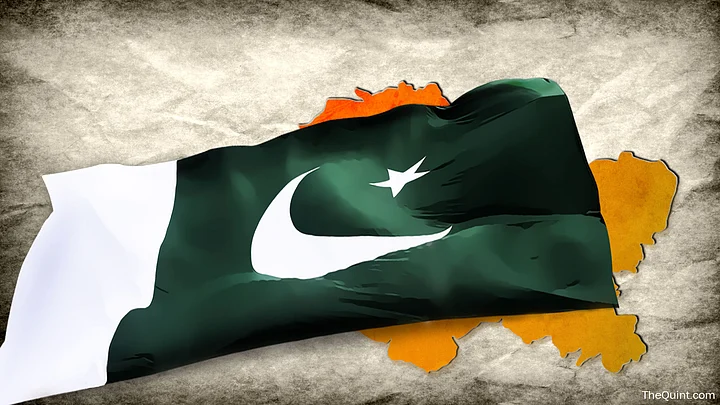Pakistan marked 20 July as a black day to protest the killing of the terrorist Burhan Wani and the action of the Indian security forces to control the situation that consequently developed in Kashmir. The Pakistani people showed no enthusiasm despite a few rallies, political statements and the chest-thumping of Hafiz Saeed and the right wing Jamaat-e-Islami leaders.
However, Pakistani TV channels repeatedly carried video clips showing Prime Minister Nawaz Sharif condemning India for denying Kashmiris the right to self-determination. He also called on the international community to ensure that India respected the human rights of the Kashmiri people.
Why has Nawaz Sharif, who has supposedly struck a good relationship with Prime Minister Narendra Modi, taken such a hard attitude on Kashmir? Is it to gain votes in the PoK assembly elections that are being held today? Is it because of the pressure from the army? Is it to cater to the demands of his right-wing religious supporters in Punjab, the most influential of Pakistani provinces and his political base?
Nawaz Sharif has
acted partly because of all these reasons, but the fact is that he has
personally always been a hardliner on Kashmir. He has shown this commitment all
through his political career. On Kashmir, there is no difference between Sharif
and the army, and this is no exaggeration.
Opportunity for Nawaz
The killing of Burhan Wani provided Nawaz Sharif an opportunity to reiterate his Kashmiri credentials and commitment. He returned from London after his open heart surgery on 9 July. The very next day he issued a statement expressing “deep shock” at the killing of “Kashmiri leader” Burhan Wani. He decried the use of “excessive and unlawful” force against civilians who were protesting Wani’s killing. He also called on the international community and the United Nations to ensure that Kashmiris were given the right to self-determination and India respected their human rights.
The Pakistani diplomatic machinery went into top gear, clearly on Nawaz Sharif’s instructions. Foreign diplomats in Islamabad were briefed on the Kashmir situation. Nawaz Sharif’s foreign policy adviser Sartaj Aziz wrote to the UN Secretary General and the international Islamic organisation, the OIC (Organisation of Islamic Cooperation), alleging that J&K is a “constant source of tension and instability in the region and a threat to international peace and security.”
The Game Plan
Pakistan constantly tries to persuade the international community to intervene in J&K but no country really wishes to get into the quagmire of India-Pakistan issues. Under Pakistani pressure, the OIC issues strong statements on the rights of the “Kashmiri” people but individual Islamic countries do not wish to upset their relations with India.
Thus, Pakistan gets little satisfaction, but that has never deterred Nawaz Sharif and the Pakistani establishment, both military and civilian, from trying. On this occasion too, the army’s corps commanders discussed the Wani killing and General Raheel Sharif condemned the “brutal killing of innocent Kashmiris.”
Instructions would have surely also gone to the separatist leadership in Kashmir to ensure that the protests continued. There is anger in the Kashmir valley after Burhan Wani’s killing. This is largely because he was able to acquire a larger-than-life image at a very young age, through the skillful use of social media.
But to believe that the agitation is “home-grown”, which Pakistan is seeking to exploit, is absolutely incorrect.
There is nothing “home-grown” about Kashmiri agitations; all is manipulated by Pakistan through the fear of the gun. This is established by Hafiz Saeed who proudly said yesterday that Wani had spoken to him sometime ago.
Wani had said now that he had done so, all that he desired was shadat. It is no secret that Hafiz Saeed and the Lashkar-e-Toiba act at the behest of the Pakistani generals and their instructions are passed through the ISI.
Pakistani Perfidy
- Nawaz Sharif’s recent statements, in the
wake of Burhan Wani’s killing shouldn’t surprise anyone as he
is a known hardliner on Kashmir.
- Pakistan trying to reach out
to the international community on the issue of Kashmir showcases how it is trying to stoke passions in the valley.
- Despite claims that most of the
protests in Kashmir were ‘home-grown’, Pakistan’s discreet involvement can’t be
ruled out; as is evident from Hafiz Saeed’s recent comments on Wani.
- Contradiction between
Pakistan’s approach towards Kashmir and a policy on cooperation with India
casts a shadow on bilateral relationship.
Nawaz Sharif’s Dilemma
Nawaz Sharif does not see any contradiction between his commitment to Kashmir and desire to adopt a pragmatic policy towards cooperation with India. He realises that the Pakistan economy cannot be set on a stable path unless it opens up with India. Thus, he wishes to pursue a twin approach: calibrate support for Kashmiri terrorism and cooperate with India in other areas.
While he claims, in line with Pakistan’s standard position that it only supports Kashmiris diplomatically, politically and morally, Nawaz Sharif has full sympathy for the Punjab- based terrorist groups such as the Lashkar-e-Toiba and the Jaish-e-Mohammad in their activities in Kashmir.
In this context, it is noteworthy that it
was Nawaz Sharif, who, in 1990, when he was the Chief Minister of Punjab, demanded that Pakistan should annually observe a Kashmir Day. That was at the
beginning of the Pakistan-instigated troubles in J&K. The Benazir Bhutto-led PPP government obliged and ever since, 5 February is a national holiday for
the people to renew their pledges of support for Kashmir.
Indeed, had Musharraf’s foolhardy and futile Kargil adventure succeeded, Nawaz Sharif would have been the first to claim being its father.
(The writer is a former Secretary (West), Ministry of External Affairs. He can be reached at @VivekKatju)
Also read:
Mehbooba’s Healing Touch Policy Hit as Kashmir Remains on Edge
J&K Security Forces Covering up Lapses by Claiming Infiltration
